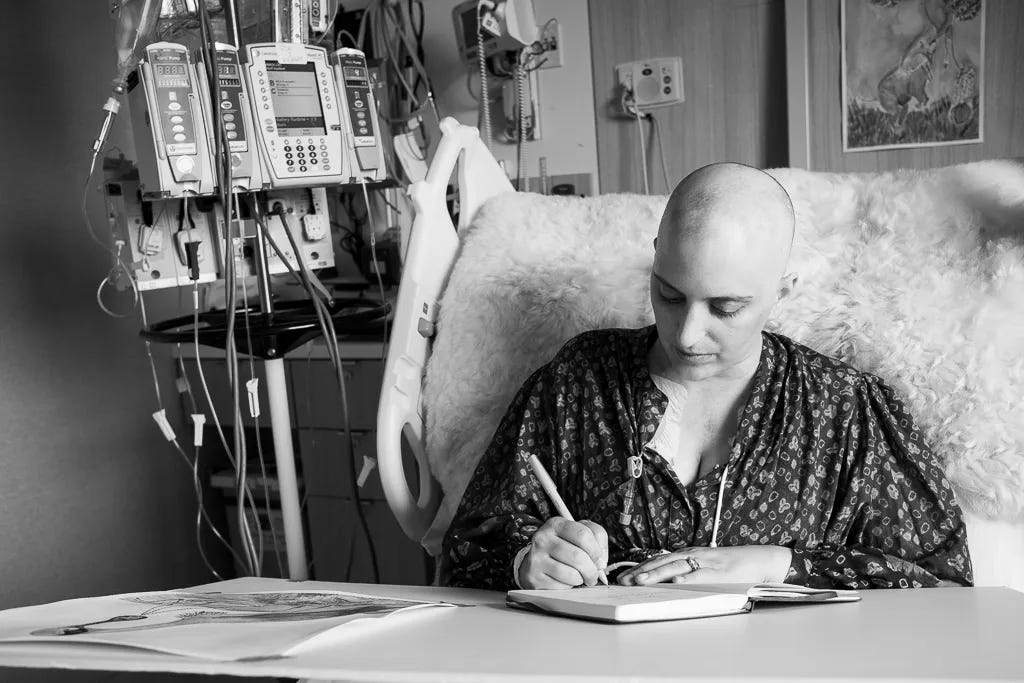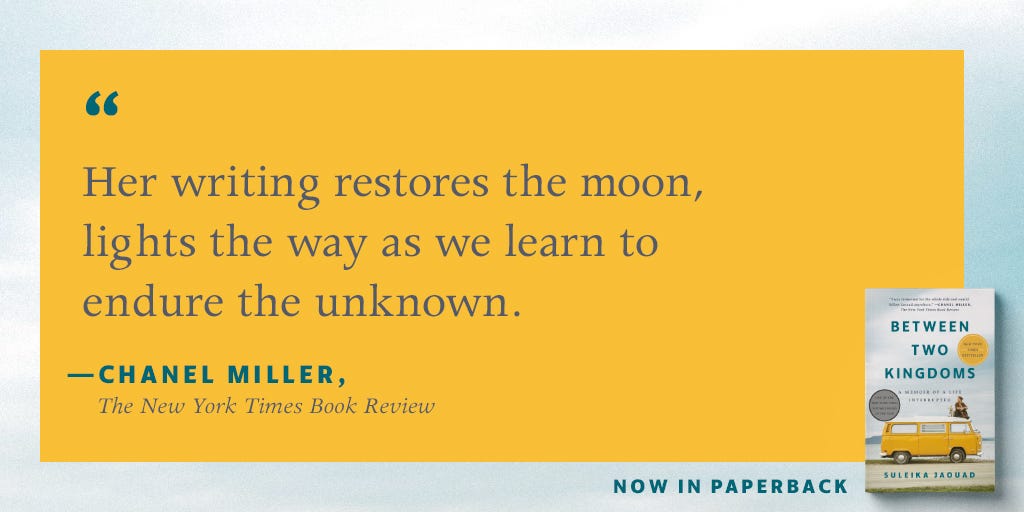Prompt 228. When Doing Your Best Falls Short
& a prompt on doing better by Carmen Radley
Hi friend,
I’ve been poring over the comments section from last week’s newsletter about final goodbyes—so many moving responses to LaTonya Yvette’s essay, so many heartbreaking farewells. I felt so much tenderness as I read each story. I felt deep compassion for each person expressing regret over a goodbye they couldn’t or didn’t or weren’t allowed to say, or a goodbye that just felt awful. It seems to be such a common reaction when something feels bad or off—to wonder what you could have done differently, how you should have done more.
I would also argue that these stories inspire an equally universal reaction, which is the response that I had, and that so many others had—to extend grace, to suggest self-forgiveness. Why is it so much easier to do that for another than for ourselves?
For me, extending grace has been crucial in navigating difficult passages and the uncomfortable social dynamics that spring from them. Having faced grave illness twice now, and many more times as a friend or caregiver, I’ve experienced the full range of things people say and the ways they show up—or don’t. I admit to feeling very hurt or angry by the way certain people in my life have responded to my circumstances in the past. But I’ve also come to believe that people are not good because they showed up well or bad because they didn’t. We have differing capabilities and we’re all carrying private burdens, and how we are in any one given moment—even the hardest ones, maybe especially the hardest ones—is not a moral litmus test. It’s not the definitive judgment of your quality as a person or your capacity for love. There is no one right way to walk through those valleys.
Recently I learned about the Buddhist concept of right action—which is acting from a well-intentioned and wise motive, without attachment to the outcome. I love the idea of carrying this as an orientation, and it’s something I’ve been working on.
And to take it a step further, I also want to operate under the assumption (until proven otherwise) that others are also well-intentioned and acting in good faith. Of course, I’m not suggesting we should tolerate abusive behaviors or outright cruelty. But it’s interesting to notice that if I extend judgment to other people, I extend it tenfold to myself; the grace I extend to other people comes back as grace for myself when I inevitably make my own missteps. So even if someone is acting in ways I don’t particularly like, it’s such a relief to think, “They’re doing their best.”
Doing your best: it’s a complicated phrase, one that came up several times when my Isolation Journals comrade Carmen and I were talking this week. I have a very fraught relationship with what my best is. I also think it can be used as a shield—as in, “I’ve done my best, so leave me alone.” But there’s also a truth to the fact that our best is all we can do, which Carmen examines in the essay and prompt below.
Sending love,
Suleika
Some Items of Note—
I just sent out the latest installment of Dear Susu, my advice column where I answer questions about writing and life and everything in between. This time the question came from a community member who asked, “How do I make peace with changes in my appearance?” You can read it here!
In the next week, I’ll be sending out the third part of our New Year’s journaling challenge—a recorded conversation about the creative process between my beloved Jon Batiste and me—so keep an eye on your inbox!
In the Isolation Journals Chat, we’re continuing our weekly ritual: our chorus of collective gratitude. You can add yours here!
Prompt 228. Free Will in Reverse by Carmen Radley
Several months ago, in a therapy session, I found myself recounting a challenging situation—what happened, what I thought had gone wrong, all those “I wish I’d done this” or “if only I’d done that.” My therapist saw that I was caught in a little whirlpool of regret and self-recrimination, and she stopped me and said, so gently and earnestly, “Carmen, you did your best.”
It was meant to be comforting, but I had the complete opposite reaction. I felt crestfallen and like a failure. I told her that I knew this response wasn’t healthy, but I heard in her words a critique: “Your best wasn’t good enough.”
I’ve thought about this many times since, and it’s been pretty illuminating. I can see a rigid perfectionism in myself, braided together with a thick thread of people-pleasing and another of codependency. I see a larger story I’m telling myself: If I do the perfect thing—respond with the perfect blend of tenderness and tough love for a friend struggling with addiction, or show up in the fullest, most helpful, most loving way when someone gets sick—I can fix anything. If I say the right words, look the right way, or perform perfectly, it’ll be alright.
I don’t know exactly where this story came from, or how long I’ve been holding onto it. I could have learned it from anywhere: from family or friends or religion or school or some societal messaging. Maybe I manufactured it myself; maybe it’s how my brain copes with uncertainty. Whatever the case, it feels old, and it’s exhausting. It makes me anxious—about mistakes I made ten years ago, how I might miss the mark today, and the many ways I’m going to screw up in the future. And honestly, it’s a little absurd. I carry a sense of responsibility for so many things I’m not responsible for. I cling to an illusion of control over things that are way beyond my control.
So I’m trying to replace that story with a different idea, which I encountered a few years ago in a conversation with a philosopher (I’ll spare you the details). More humble, less self-centered, and joyously liberating, it’s this: Whatever action you took in a given moment, it was what you’d been wired and conditioned to do. What you did was the only thing you ever could have done.
Sometimes I struggle with this notion, because it feels fatalistic, as if we’re trapped by both nature and nurture. I want to shout, “Where’s my free will?!” But mostly it calms me, when my head is swirling with those irrational “if onlys,” when I fear the weight of all my future mistakes.
I’m coming to think of it almost as free will in reverse. I can do my best, and it might fall short. My best might not be the best. But from that experience, I can learn, and I can do better.
Your prompt for the week:
Think of a moment from the past that you replay in your mind, big or small, important or unimportant. Write about what you did, what you learned from it, and whether that knowledge has changed your actions—or how it might.
If you’d like, you can post your response in the comments section, in our Facebook group, or on Instagram by tagging @theisolationjournals.
Today’s Contributor
Carmen Radley is the editor of the Isolation Journals. She’s currently writing a climate change memoir about her hometown of Sour Lake, Texas, an early twentieth-century oil boomtown where her family has worked in the oilfield for more than a century. She lives in Austin.
If you’re new here—hi, I’m Suleika!
I’m the author of the memoir Between Two Kingdoms, a New York Times bestseller, as well as the Emmy Award-winning column “Life, Interrupted,” which I wrote from my hospital bed when I was undergoing cancer treatment in my early 20s. I’m also a lifelong journaler, a practice that got me through my first bout with leukemia and is helping me navigate a second.
I founded the Isolation Journals in April of 2020, and it’s grown into a vibrant community of over 100,000 people from all over the world—all looking to transform life’s interruptions into creative grist. My dear friends Carmen Radley and Holly Huitt help steward this little corner of the internet, which is big-hearted and smart and just plain wonderful.
One last note: If you have questions, you can check out our FAQ—or write to us at suleika@theisolationjournals.com.














This reminded me of something a therapist said to me, many years after I stopped seeing him. He had held space for me as I recounted years of neglect and abuse and helped me through a time of serious falling apart...a decade of anxiety and depression issues...the suicides of my brother and father. Years later, I married again and it was an abusive man. I felt I should have known better, since I was now "all healed." i had such tremendous guilt for making that decision. I ran into him and told him how stupid I felt for doing that. He reminded me of just what Carmen writes about...that many things led up to the decision to fall in love with...and marry another abusive man. I had done the best I could with everything I knew up to that point. Soon I will be celebrating my 30th anniversary with a wonderful, caring, gentle man. I did learn...and I broke a cycle.
When my second marriage finally fell apart, I spent years wishing I could get a “do over”. Not a second chance to get the marriage right. A second chance to get the ending right.
Shortly after I moved out of my married home and into an apartment of my own, I started dating. It was an unconscious attempt to distract myself from the heartache and everything that felt painful and difficult. I picked up dating like some people pick up drugs or drinking.
The fact of my dating was convenient ammunition for my ex. He laid all the blame for the failure of our marriage at my feet.
I wanted to be beyond contempt. I wanted to maintain my status as the victim. I had given that up with my compulsive dating.
What did I learn? So many things—notably my need to be “right”, to be blameless, to be justified. My sense of worth was so fragile that I could not afford to be challenged—I would fall apart like a house of cards.
What’s different? I accept that I am flawed and guilty and that I cannot escape being human, but I also learned that I am good enough, that I am worthy. Worthy of love, compassion and forgiveness, from others and from myself.